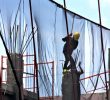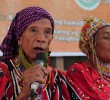But the abundance of supply could not diminish the feeling of longing for their loved ones.
�(Ang) cell site du�n, tiyempuhan, mga 3 a.m. kami tumatawag sa �Pinas� (Cell sites there emit signals by fits, we could call our relatives in the Philippines at around 3 a.m.), he lamented.
He also complained that their salary was being deducted by the agency, saying only almost $200 were left to them.
Because they could not go out of the camp, they could only wait for fellow Filipinos whom they could ask to send their money to their families in the Philippines. Although offering its services, they do not trust the agency, which deducts so much from their salary, to remit their money to their families.
�Kapag ilang salin na ng pagpapadalhan, ilang $5 din ang nababawas� (They always deduct $5 from our salaries), said the regretful Rebamba.
They were allowed to take a vacation in Kuwait every quarter or convert the vacation into cash. So he would choose the vacation so he could personally send money to his mother in the Philippines.
Danger
�Kung mamamatay tayo, mamamatay tayo kahit sa Pilipinas� (If we are fated to die, we could die even in the Philippines). This became the motto of the OFWs risking their lives in Iraq. �Ang buhay ng OFWs du�n tsambahan lang� (OFWs there live their lives by chance).
Migrant workers were only briefed about the safety measures upon arrival in the camp, said Rebamba who bought his own bullet-roof vest and helmet. He only feared possible aerial poisoning which most of them have not been prepared from.
In one incident, he was about to deliver 200 pieces of aircon to another camp when something exploded in Camp Anaconda. The generator was bombed. The explosion was so strong that shrapnel the size of corn kernels passed through four double plywood-walled rooms.
In separate incidents, Rebamba saw a fellow Filipino die while on a convoy, an OFW who got blind after shrapnel penetrated his eyes, and another whose chest was pierced with shrapnel fragments.
When crossing an ambush site to Camp Bacoba, Rebamba was just holding his breath.
When he was in Camp Bacoba transporting those who would clean the shower room of the soldiers, he almost spilled his coffee with the tremor that a strong explosion caused.
Outside the camp, they found the car of a suicide bomber already on fire after US soldiers fired at it.
In fear for his life, being an unarmed man inside the camp, Rebamba once thought of joining the military.
�Kung puwede lang may hawak akong baril hahawak ako talaga� (If only I�m allowed to get hold of a gun,I�d really get hold of one), he said. But his application was denied because of age limitation. He was 32 years old then and the U.S. soldiers told him they prefer those below 30 years of age.
Lately, he learned that Filipino security guards and ex-service men applying in Iraq were paid higher salary.
Pinoy Life Abroad









